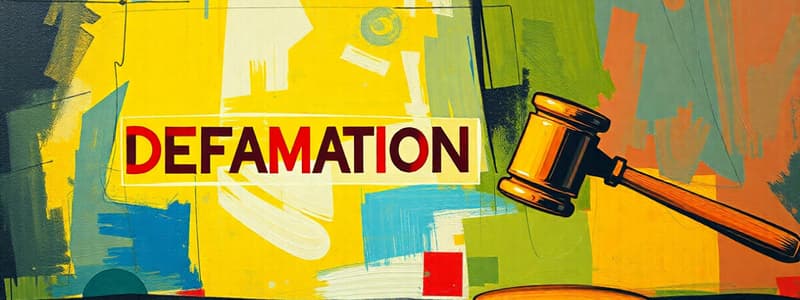Podcast
Questions and Answers
Who can sue for libel?
Who can sue for libel?
- Any living individual, including children and companies (correct)
- Only government departments
- Only foreigners
- Only individuals over 18 years old
According to the defamation act of 2013, all cases are now tried by a jury.
According to the defamation act of 2013, all cases are now tried by a jury.
False (B)
Who cannot sue for defamation under the current act?
Who cannot sue for defamation under the current act?
The dead
In cases of defamation, a poorly worded correction could make matters worse and even end up __________ someone else.
In cases of defamation, a poorly worded correction could make matters worse and even end up __________ someone else.
Match the following parties with their ability to sue for defamation:
Match the following parties with their ability to sue for defamation:
What is the time limit for bringing a libel action under the single publication rule?
What is the time limit for bringing a libel action under the single publication rule?
Each access to an archived article counts as a new publication under the defamation act.
Each access to an archived article counts as a new publication under the defamation act.
What does the single publication rule protect for publishers?
What does the single publication rule protect for publishers?
The 12-month limitation period for taking action begins from the date of the __________ publication.
The 12-month limitation period for taking action begins from the date of the __________ publication.
Match the following scenarios with their outcomes regarding libel actions:
Match the following scenarios with their outcomes regarding libel actions:
Under the Defamation Act 2013, what must companies demonstrate?
Under the Defamation Act 2013, what must companies demonstrate?
A complainant does not need to identify themselves explicitly to be protected under defamation laws.
A complainant does not need to identify themselves explicitly to be protected under defamation laws.
What must the defamed person prove regarding the statement made about them?
What must the defamed person prove regarding the statement made about them?
The judge will use the intelligence and judgment of a(n) ______ person to decide on defamation.
The judge will use the intelligence and judgment of a(n) ______ person to decide on defamation.
Which of the following could be considered a serious financial loss for a small company?
Which of the following could be considered a serious financial loss for a small company?
Match the following concepts to their definitions:
Match the following concepts to their definitions:
A tweet that is only seen by a handful of people cannot lead to substantial damages.
A tweet that is only seen by a handful of people cannot lead to substantial damages.
What action should a complainant take if they wish to avoid being defamed?
What action should a complainant take if they wish to avoid being defamed?
What can a digitally enhanced photo potentially create?
What can a digitally enhanced photo potentially create?
Juxtaposition can lead to a libellous impression when a headline accompanies a photo.
Juxtaposition can lead to a libellous impression when a headline accompanies a photo.
What is required when using archived photos in potentially defamatory contexts?
What is required when using archived photos in potentially defamatory contexts?
A caption describing someone as a 'DISGRACED businessman' along with their arrest photo is an example of ______.
A caption describing someone as a 'DISGRACED businessman' along with their arrest photo is an example of ______.
Match the following terms with their definitions:
Match the following terms with their definitions:
Which of the following is an example of repetition in a defamatory context?
Which of the following is an example of repetition in a defamatory context?
The single publication rule means that every publication of defamatory content is a separate libel action.
The single publication rule means that every publication of defamatory content is a separate libel action.
What can result from the careful use of general shots in media?
What can result from the careful use of general shots in media?
What is one of the requirements that a claimant must prove to bring a libel action?
What is one of the requirements that a claimant must prove to bring a libel action?
A defendant can automatically win a defamation case if the words mentioned do not name the individual involved.
A defendant can automatically win a defamation case if the words mentioned do not name the individual involved.
What is required to show that a statement is defamatory?
What is required to show that a statement is defamatory?
To succeed in a defamation claim, the claim must show that the words referred to the ______.
To succeed in a defamation claim, the claim must show that the words referred to the ______.
Which of the following is NOT one of the common law definitions of a defamatory statement?
Which of the following is NOT one of the common law definitions of a defamatory statement?
Match the following elements of defamation with their descriptions:
Match the following elements of defamation with their descriptions:
The Supreme Court ruling in Lachaux V Independent Print Ltd clarified that the claimant only needs to prove the words inherently cause serious harm.
The Supreme Court ruling in Lachaux V Independent Print Ltd clarified that the claimant only needs to prove the words inherently cause serious harm.
What must a claimant demonstrate regarding the actual impact of defamatory words?
What must a claimant demonstrate regarding the actual impact of defamatory words?
Flashcards
Defamation Act 2013: Jury Trials
Defamation Act 2013: Jury Trials
The Defamation Act of 2013 significantly changed how defamation cases are handled in courts. It removed the presumption of a jury trial, meaning cases are now typically heard by a judge alone. This change aimed to bring greater consistency and fairness to defamation judgments.
Who Can Sue for Libel?
Who Can Sue for Libel?
Any living individual can sue for libel, including children and foreigners. Companies can also sue for defamation.
Who Can Be Sued for Libel?
Who Can Be Sued for Libel?
The 'author' of a defamatory statement can be sued. This includes not only the writer or speaker, but also the editor and publisher. This applies to all forms of media, including traditional and new media outlets.
Correcting Errors in Defamation Cases
Correcting Errors in Defamation Cases
Signup and view all the flashcards
Unpredictability of Defamation Lawsuits
Unpredictability of Defamation Lawsuits
Signup and view all the flashcards
Identification Error
Identification Error
Signup and view all the flashcards
Repetition Libel
Repetition Libel
Signup and view all the flashcards
Inaccuracy in Caption
Inaccuracy in Caption
Signup and view all the flashcards
Changed Circumstances
Changed Circumstances
Signup and view all the flashcards
Misleading Information in Photos
Misleading Information in Photos
Signup and view all the flashcards
Juxtaposition Libel
Juxtaposition Libel
Signup and view all the flashcards
Digitally Altered Photos
Digitally Altered Photos
Signup and view all the flashcards
Innuendo in Photos
Innuendo in Photos
Signup and view all the flashcards
Defamation Action Requirements
Defamation Action Requirements
Signup and view all the flashcards
Defamatory Statement
Defamatory Statement
Signup and view all the flashcards
Identification in Defamation
Identification in Defamation
Signup and view all the flashcards
Publication in Defamation
Publication in Defamation
Signup and view all the flashcards
Serious Harm in Defamation
Serious Harm in Defamation
Signup and view all the flashcards
Factors to Assess Serious Harm
Factors to Assess Serious Harm
Signup and view all the flashcards
Legal Costs of Defamation
Legal Costs of Defamation
Signup and view all the flashcards
Defamation and the Supreme Court
Defamation and the Supreme Court
Signup and view all the flashcards
Single Publication Rule
Single Publication Rule
Signup and view all the flashcards
First Publication
First Publication
Signup and view all the flashcards
Republishing?
Republishing?
Signup and view all the flashcards
Repeat Defamation
Repeat Defamation
Signup and view all the flashcards
Defamation Time Limit
Defamation Time Limit
Signup and view all the flashcards
Defamation for Companies
Defamation for Companies
Signup and view all the flashcards
Context is Key in Defamation
Context is Key in Defamation
Signup and view all the flashcards
Innuendo and Imputation in Defamation
Innuendo and Imputation in Defamation
Signup and view all the flashcards
Judge's Role in Defamation
Judge's Role in Defamation
Signup and view all the flashcards
Libel Trial - Passing the 'Serious Harm' Test
Libel Trial - Passing the 'Serious Harm' Test
Signup and view all the flashcards
Captions and Photos in Defamation
Captions and Photos in Defamation
Signup and view all the flashcards
Study Notes
DEFAMATION
- Major changes to the Defamation Act 2013: Jury trials are no longer automatic, cases are heard by a judge sitting alone unless otherwise ordered. This change aimed to reduce excessive jury awards.
Who Can Sue for Libel?
- Living individuals (including children and foreigners)
- Companies
Who Can Be Sued?
- Authors (writers, speakers)
- Editors
- Publishers
- All forms of media (both traditional and new)
Who Cannot Sue?
- Deceased individuals
- Councils
- Clubs/associations
- Political parties
- Government departments
Defamation and Apology
- If you make a mistake and someone complains, wait to find the editor before responding. Incorrect responses may worsen a situation and potentially defame other individuals
- Carefully worded corrections are crucial to avoid escalating issues.
Newspaper Reluctance
- High legal costs associated with libel cases discourage newspapers from engagement.
Interpreting Statements in Court
- Proving statements in court is unpredictable.
- Court procedures are variable and unpredictable
- Witness reliability and testimony are difficult to guarantee
- Legal fees are substantial
- Awards for damages are likely to exceed initial estimates
Elements of Defamation Law
- The claimant needs to demonstrate that their reputation has been harmed as a result of an action by someone who was aware of their action
- The claimant must prove the following:
- Defamation: The words harmed the claimant's reputation
- Identification: The defamatory words were actually referencing the claimant
- Publication: The words were communicated to at least one person beyond the writer
Defences Against Defamation
- Claims should be carefully reviewed for any defence against actions for defamation.
What is Defamation?
- There are four main legal definitions for a defamatory statement:
- Cause the complainant to be shunned or avoided.
- Lower their reputation in the eyes of others.
- Expose them to hatred, ridicule, or contempt.
- Damage their reputation/standing in their profession.
Captions and Photos in Defamation Cases
- Incorrect identification in photos or captions can lead to defamation suits.
- Repeating defamatory statements in photos can constitute libel.
- Inaccurate captions can be defamatory.
- Photos capturing changed circumstances (e.g., a person's marital status or employment) can be defamatory.
Single Publication Rule
- Each new publication of defamatory content (e.g., posting online, reprints in a new form) can result in legal action.
- A time limit (12 months from first publication) applies to defamation cases if the statement is repeated.
Studying That Suits You
Use AI to generate personalized quizzes and flashcards to suit your learning preferences.




